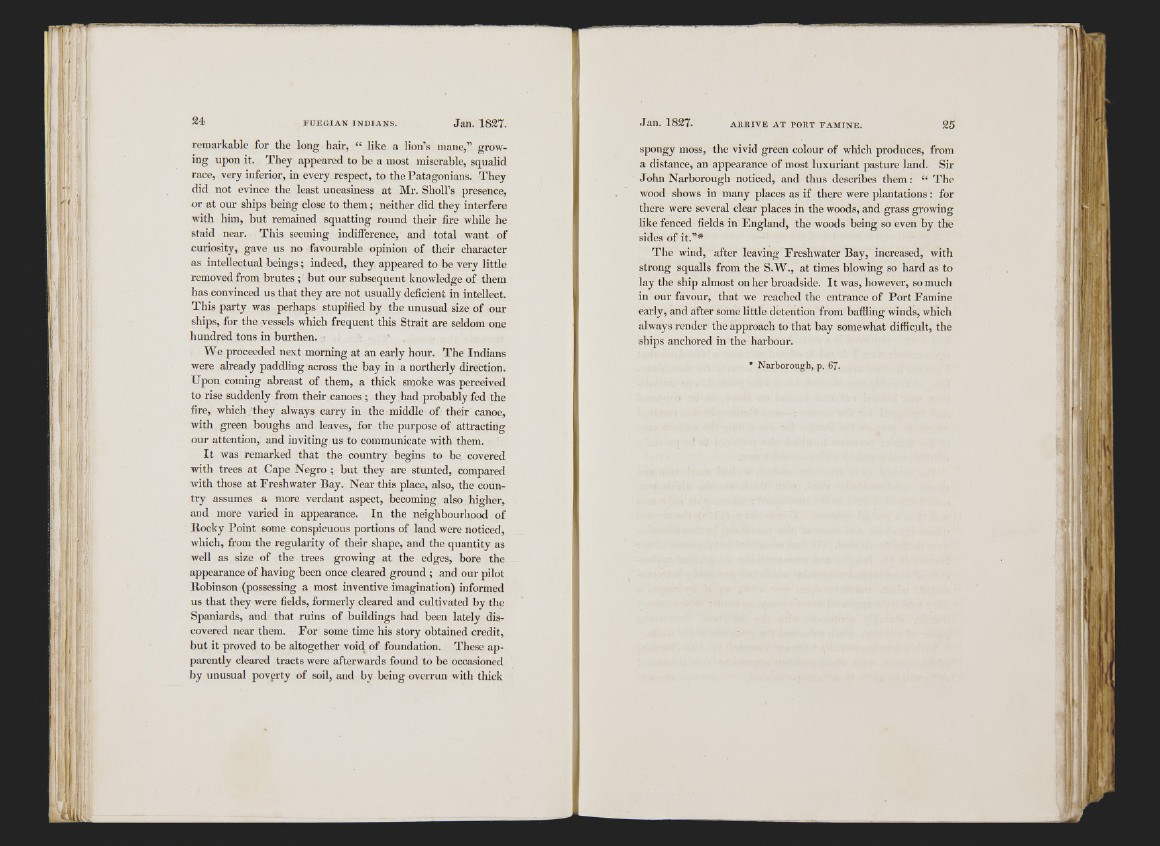
■I !'
i *
’■ i' I' remarkable for the long hair, “ like a lion’s mane,” growing
upon it. They appeared to be a most miserable, squalid
race, very inferior, in every respect, to the Patagonians. They
did not evince the least uneasiness at Mr. SholFs presence,
or at our ships being close to them; neither did they interfere
with him, but remained squatting round their fire wliile he
staid near. This seeming indifference, and total want of
curiosity, gave us no favourable opinion of their character
as intellectual beings; indeed, they appeared to be very little
removed from brutes ; but our subsequent knowledge of them
has convinced us that they are not usually deficient in intellect.
This party was perhaps stupified by the unusual size of our
ships, for the vessels which frequent this Strait are seldom one
hundred tons in burthen.
We proceeded next morning at an early hour. The Indians
were already paddling across the bay in a northerly direction.
Upon coming abreast of them, a thick smoke was perceived
to rise suddenly from their canoes ; they had probably fed the
fire, which they always carry in the middle of their canoe,
with green boughs and leaves, for the purpose of attracting
our attention, and inviting us to communicate with them.
It was remarked that the country begins to be covered
with trees at Cape Negro ; but they are stunted, compared
with those at Freshwater Bay. Near this place, also, the country
assumes a more verdant aspect, becoming also higher,
and more varied in appearance. In the neighbourhood of
Rocky Point some conspicuous portions of land were noticed,
which, from the regularity of their shape, and the quantity as
well as size of the trees growing at the edges, bore the
appearance of having been once cleared ground ; and our pilot
Robinson (possessing a most inventive imagination) informed
us that they were fields, formerly cleared and cultivated by the
Spaniards, and that ruins of buildings had been lately discovered
near them. For some time his story obtained credit,
but it proved to be altogether void of foundation. These apparently
cleared tracts were afterwards found to be occasioned
by unusual poverty of soil, and by being overrun with thick
It
spongy moss, the vivid green colour of which produces, from
a distance, an appearance of most luxuriant pasture land. Sir
John Narborough noticed, and thus describes them: “ The
wood shows in many places as if there were plantations : for
there were several clear places in the woods, and grass growing
like fenced fields in Fngland, the woods being so even by the
sides of it.”*
The wind, after leaving Freshwater Bay, increased, with
strong squalls from the S.W., at times blowing so hard as to
lay the ship almost on her broadside. It was, however, so much
in our favour, that we reached the entrance of Port Famine
early, and after some little detention from baffling winds, which
always render the approach to that bay somewhat difficult, the
ships anchored in the harbour.
• Narborough, p. 67.
1<I